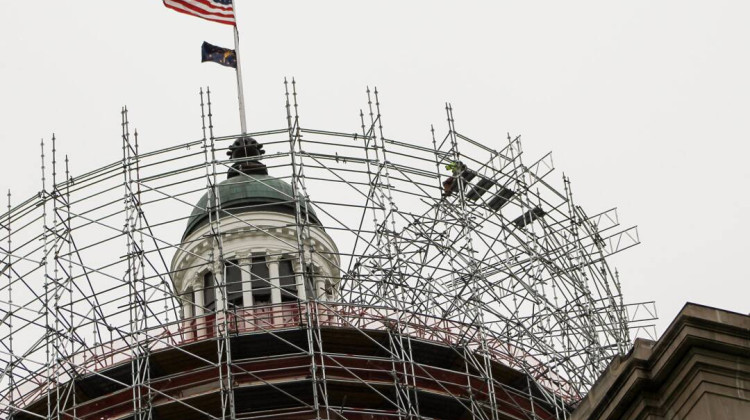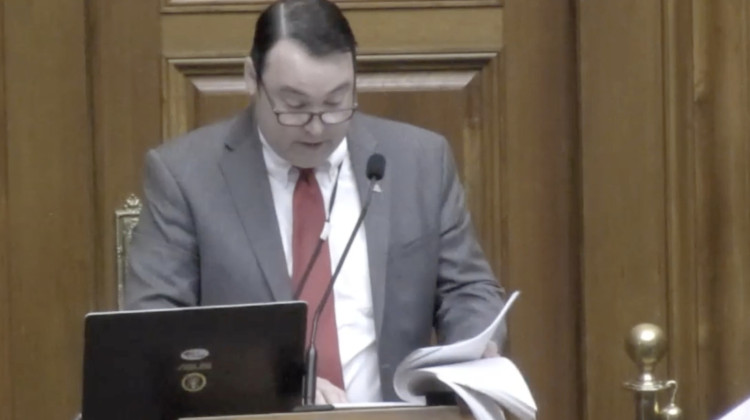
Desks sit collecting dust in a classroom on Thurs., Feb. 8, 2024 at the former School 11, which a charter school used for two years before selling the building in Indianapolis, Indiana.
Amelia Pak-Harvey/ChalkbeatThe dust in the brick building on east 42nd Street is so thick that visitors have written their names on the counter of what was once a school cafeteria.
Desks are all that remains of an old science lab. Basketballs sit in the corner of the school gym.
The former Indianapolis Public School building in the Meadows neighborhood was sold in 2012 by IPS to a charter school for $1 under a law designed to provide vacant facilities to charter schools.
But the structure hasn’t housed a school in a decade: It was resold for $225,000, and then again for $10,000. It is now owned by a church and is poised to become a community center.
Another IPS building on the far eastside that was sold to a charter school for $1 changed hands between multiple limited liability companies. At one point, it sold for $1.4 million. It has since been heavily renovated with the proceeds of those sales, according to school officials, and is now the home of Tindley Summit Academy, a K-6 charter school.
Indiana’s so-called “$1 law,” which has been on the books since 2011, has come under fire — particularly in Indianapolis. A battle is brewing over six former school buildings that could eventually be sold under the law, which requires school districts to sell or lease closed school buildings to charter schools or higher education institutions for $1.
But the fates of these two buildings — the only two sold by IPS under the $1 law, according to a Chalkbeat analysis — shows that the controversial piece of legislation has rarely brought about its intended effect in Indianapolis.
The challenge isn’t necessarily with the sale but what comes next: Even when charters have managed to acquire buildings for $1 without legal dispute, the buildings have required pricey renovations that charters must pay for on their own, officials with these schools say. That can make opening and maintaining a school in these facilities trickier than the sticker price might imply.

Historically, charter schools have not received funding from property taxes that go to traditional public school districts, creating a struggle to pay for capital investments.
Despite acquiring the buildings for $1, charters say they did not turn a profit in the subsequent sales to other entities, due to the money they invested in restoring and upgrading the buildings. Under the $1 law, the charters would have had to turn over any such profits to IPS.
The number of buildings sold under the $1 law could increase significantly soon. Lawmakers are considering amending the law this year to essentially clarify that the six schools IPS closed last year are not exempt from the statute.
Acquiring underutilized facilities for $1 can be a good deal for charters pushed for space, said Chris Lubienski, director of the Center for Evaluation and Education Policy at Indiana University.
But in addition to the challenge of renovations, the transactions raise questions about whether the law is beneficial and transparent for taxpayers, who paid to have these buildings constructed only to see them sold for next to nothing.
“Overall, when you look at the transfer of assets, it raises some big questions about what are the taxpayers in Indianapolis, in this case, getting for the money they had in the past invested into those facilities,” he said.
First school sold for $1 vacant for years
In 2012, IPS made its first $1 sale when KIPP Indy bought School 11.
KIPP Indy, a charter network that at the time only operated a middle school, had to move locations when IPS canceled the network’s building lease at Julian Coleman School 110, according to the network. So KIPP Indy’s acquisition of School 11 was timely.
But the building needed substantial renovations, such as new technology infrastructure and lockers, according to KIPP Indy. Considering both in-kind and direct investments, KIPP Indy says it put about $450,000 into the building.
The school spent two years there, then departed before the 2014-15 school year to return to the Coleman building, where the network now operates its elementary and middle school.
That’s the last time the building housed a school.
KIPP Indy sold the building in 2017 for $225,000 to Global School Properties Indiana, LLC, a Virginia-based business. Since KIPP Indy put more than $225,000 into the building, there were no profits from the sale that KIPP Indy had to redirect to IPS, according to the network.
State business records show the CEO of Global School Properties is Ronald Packard, the former head of the for-profit K12, Inc. — now known as Stride — which has opened virtual charter schools nationwide.
A spokesperson for Global School Properties Indiana, Courtney Harritt, said although the corporation made the purchase with the intention of opening a charter school, the “timing ended up being off.”
The corporation sold the building in 2022 to the local Hovey Street Church for just $10,000.
Denell Howard, the church’s pastor, hopes to turn the abandoned school into an education and community center through his nonprofit. On part of the seven-acre property behind the building, a local gardening operation has already set up shop with several garden beds and chickens. Howard is also hoping to build a walking trail.
Still, Howard says he needs to raise $11 million to fully renovate the building — or roughly 39 times what KIPP Indy sold the building for in 2017, after adjusting for inflation. He sees a lesson in that huge renovation cost.
“Those people who are looking at these schools and looking at utilizing them for stuff, they’re going to need support behind their vision,” he said. “And I’m not talking about just ‘Rah, rah’ support. They’re going to need financial support.”

Multiple transactions funded renovations at former School 98
In 2017, IPS sold the former T.C. Steele School 98 building on Dubarry Road for $1 to Tindley, another charter network.
But the building needed roughly $2.8 million in renovations to make it habitable for students, said Hilary Buttrick, chair of Tindley’s board of trustees. The school paid a significant portion of those costs out of its own cash reserves, she said.
Tindley sold the building, which was then sold again to its current owner for $1.4 million, in a series of financial transactions with limited liability companies that officials say helped the school repay the remainder of the renovation costs.
CIES Tindley I, LLC, which owns the building today, also owns other buildings in the Tindley network. It is affiliated with the Center for Innovative Education Solutions, an Indianapolis-based nonprofit that aims to provide cost-effective services to charters.
The Tindley charter network itself no longer owns the building, but Tindley Summit Academy operates there today.

Edreece Redmond, the executive director of the Center for Innovative Education Solutions, said in a statement that the process allowed CIES Tindley I to provide cheaper financing, passing on thousands in savings to the school, which rents the building.
Charter school funding change could supersede $1 law
A recent change to state law may reduce the need for such accounting and fundraising maneuvers, as well as the impetus for the $1 law itself.
State legislation passed in 2023 requires school districts in Marion, St. Joseph, Vanderburg, and Lake counties to proportionally share increases in tax revenue from rising property valuations with charter schools, starting in 2025.
Under a different law enacted last year, school districts in these four counties must also share funding for any voter-approved tax increases for operational or safety expenses with charters as well.
Those relatively steady sources of revenue could make it easier for charter schools looking to purchase and (if necessary) renovate facilities.
IPS and other groups representing school districts that have expressed concerns with the $1 law also opposed both measures during last year’s session.
 DONATE
DONATE






 Support WFYI. We can't do it without you.
Support WFYI. We can't do it without you.